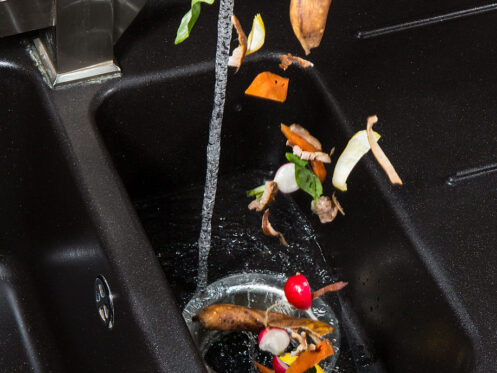Summertime brings the joy of grilled meals, cold drinks, and full kitchens. If you’ve ever heard an unexpected grind in your sink after dinner, you know how fast a party cleanup can turn stressful.
Here are some tips for avoiding mid-celebration plumbing issues; that way, you won’t have to call us at Cal’s Plumbing in the middle of a summertime party.
Mind the Pits and Seeds: Even Small Fruit Pieces Hurt
When you scoop out a bowl of peach or mango, it might feel natural to rinse the remains directly into the garbage disposal. But every peel, pit and seed has the potential to damage the blades or clog the mechanism. Soft fruit fragments tend to stick around the rim of the mouth, forming a dense mass that slows down the centrifugal action in the grinding chamber. That leads to longer run cycles to break down what would otherwise slip easily into the sewer. If seeds or pits reach deep enough, they can jam the blades or pit the chamber, shifting the internal alignment and causing uneven wear.
When you host pool parties or backyard brunches, watermelon slices often disappear faster than planned. The rind may seem coarse enough to break apart, but the plastic-like fibers and tough skin don’t break down easily. That can wear on the impellers and strain the motor. If your disposal makes a grinding screech, it might be trying to handle more than it was built for. Instead of risking the motor, you can compost the rind or toss it in yard waste. That keeps the blades spinning freely and the motor quiet, allowing guests to enjoy the sun.
Avoid Oils and Grease That Turn Solid in the Pipe
Summer meals tend to lean rich, with dishes like pasta salad, slow-cooked meats, and buttery seafood spreads showing up on your table more often. Warm grease from roasted meats or sauces feels harmless as it flows down the drain, but once it cools, it can coat the inside of your pipes with a sticky, solid layer. That film grabs stray food particles, narrowing the path for water and trapping bacteria. You might first notice a slow swirl in the sink or a sour smell lingering long after the dishes are done.
If that same grease contacts the impellers or seeps toward the motor housing, the impact runs deeper. Heat builds faster, the unit draws more power, and the moving parts grind harder than they were designed to. The lifespan of a garbage disposal drops significantly when that kind of stress becomes common.
You can head off the issue by scraping greasy pans with a paper towel or keeping a jar on hand for used cooking oil. Emptying it later feels tedious, but not when you weigh it against the cost of having a local kitchen plumber replacing worn-out bearings or motor seals.
Seafood dinners bring their own hazards. Crab shells, shrimp tails, and oyster husks might look like compostable scraps, but once they hit the grinding chamber, they turn into a disposal’s worst nightmare. They splinter into sharp shards that can pierce the metal housing or get stuck beneath the blades. When that happens, the impeller may spin unevenly or jam entirely. Even small shell flakes can throw the mechanism out of balance, leading to loud operation or total failure during the next use.
One of the easiest ways to prevent shell damage is to plan ahead. Place a separate bowl or compost bin near your prep space so guests can toss shells directly. A quick rinse under cold water before the final sink dump can help catch anything left behind. Your disposal is built to handle scraps, not seafood armor.
Beer Bottles Leave Grain and Glass Reminders
Summer gatherings often include cold drinks and bottles piled beside the sink. In the rush to clear glasses, broken bottle shards around the drain pose a serious threat. Even after sweeping up, fine fragments or grains from malted beer might slip into the disposal. Wood chips mixed with glass create grit that dulls the blades and wears down seals.
Onion, Garlic, and Caffeine: Avoid a Smelly Sink Tonight
Summer parties often include coffee, tea, or cooked dishes that rely on onion and garlic. While those ingredients make food taste great, they also leave strong odors in the disposal and the drains. Oil from garlic or pepper settles beneath the impeller, feeding bacteria and creating that lingering kitchen stench.
A trick to beat this odor lock-in is running cold water and grinding citrus peels or ice after cleanup. Ice helps scrape residue away from the impellers and chamber walls. A slice of lemon not only freshens the drain but also acts as a mild acid rinse. That extra cycle also keeps sulfur compounds from building up.
Cooling the Engine: Rest Periods Let the Motor Rest
Garbage disposals need short breaks to clear their chambers and release heat. During a summer party, you might run multiple grinding sessions back to back with coffee grounds, food scraps, and bits of ice that keep the motor running long enough to heat up and reduce its efficiency.
Heat buildup shortens motor life. As coils get warm, the insulation begins to break down, which reduces their voltage tolerance and accelerates failure. A safe habit is to run the motor, wait, and then run it again after a minute of rest and a clear water flush. These brief windows help vent trapped heat and bring the unit back to room temperature before the next load.
Reset: Know How to Handle a Jam
Despite caution, jams happen. If your disposal grinds to a halt, resist the urge to shove just anything inside. Even with the power off, a knife can slip and cause deep cuts. That’s why most units include a small hex wrench or recessed button at the bottom. Turn the power to the disposal off first, and then use the wrench to slowly work the impeller free. A careful reset button press afterward brings it back to life without revving the motor in a bind.
If the reset doesn’t fix it, look for visible foreign objects inside. Use tongs or pliers to reach down only when power to the disposal is disabled and unplugged. That step protects you and your home. Once pieces are cleared, plug them back in and run cool water to clarify the flow.
Portable Grinders and Batch Cleanup Head Off Trouble
Hosting for more than a dozen people? Consider pairing your fixed disposal with a portable, countertop food grinder. These smaller units allow you to grind citrus peels, coffee grounds, or cooked rice before sending the flow to your kitchen drain. You can unplug the grinder once the cleanup cycle ends. That lets your sink-side unit handle only fresh scraps and non-greasy matter.
Set a bin beside the grinder to catch pulp or peel waste. That simple setup contains most of the problem before it hits the sink. Your disposal stays ahead of the tougher waste, and the grinder holds everything else until you’re done. For big weekend parties or pool gatherings, this prevents a clogged disposal from stealing your summertime joy.
Temperature Matters: Stick to Cold Water and Avoid Hot Rinses
At the end of the night, consider skipping the hot water rinse. While hot water clears grease faster, it also melts oils and carries them deeper into the pipes, where they solidify and collect. Cold water helps solidify any fats closer to the drain exit, so they break into smaller pieces as they flow away. That keeps grease from building up in your disposal and keeps your home’s plumbing moving freely. Give the disposal a 30-second cold water cycle after each cleanup session. Then add a chilled rinse to push debris further.
Don’t Put it in the Disposal
Whether you’re prepping watermelon or rinsing off the last of the potato salad, your garbage disposal plays a bigger role than you might realize during summer entertaining. Paying attention to what goes in can save you from dealing with the consequences later. If something’s not running right, our plumbing services team at Cal’s Plumbing is ready to help fix it fast.
We also offer professional drain cleaning, water heater repair, and leak detection services. Call us today to learn more or to schedule a maintenance or repair visit.






